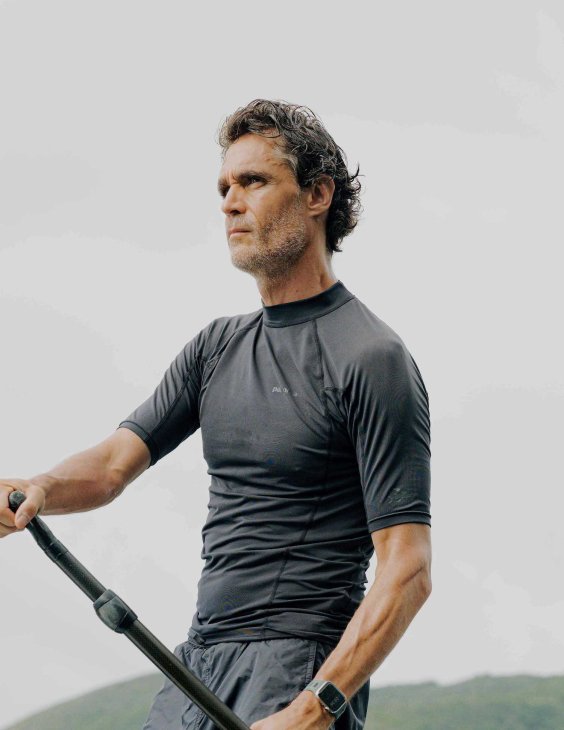Interview: Native Union CEO, Igor Duc, on navigating burnout, Trump’s tariffs and moving manufacturing out of China
The tech entrepreneur who built a business around phones is now designing products to reduce your screen time.
Native Union is the French brand that made smartphone cables and chargers a desirable design accessory – available to buy in the Apple shop – rather than freebies found in the bottom of the box. Co-founder and CEO Igor Duc built the business from Hong Kong to be close to his manufacturing partners in China. With revenues of $25m (€22m) a year, it was a winning formula until Donald Trump became president again. These are testing times for the leader of any business that makes all of its products in Asia and sells them in the US, Native Union’s largest market. Tariffs are tying Duc’s company in knots, prompting him to develop other consumer markets outside of the US and to find manufacturers in southeast Asia. “It’s a very hard moment,” says Duc, while sitting on a rock in Hong Kong looking out at the South China Sea.

Monocle joins the surfer and watersports enthusiast for an early-morning paddle around the rocky coastline near his home in Clearwater Bay. As the sun shines through the clouds, the 44-year-old Parisian claims to be a little older and wiser during Trump’s second term: less prone to panic, better equipped to avoid burnout and more able to tackle stressful situations. The serial entrepreneur also hopes to solve the universal issue of technology addiction. “I want to create a new product to rebalance tech usage,” he says. “No one has made one yet. If they had, I’d be using it.”
Waking up at 06.45 to answer emails on his phone, his day finishes in the same way at 23.30. “The problem of having a global business is that there is zero downtime,” says Duc, listing some of the ways that he has tried to disconnect, from using a dumbphone to locking his devices in a glass jar. For now, nature and sport are the best tonic. Duc moved to a seaside village in eastern Hong Kong 12 years ago, right before the birth of the first of his three children. Kayaks and paddleboards line the beach, while wild boars can be heard grunting in the forested hills.
Technology addiction has been on Duc’s mind for the past five years. “I was extremely close to burnout,” he says. There is an obvious irony in that the businessman who has made a big success out of connecting us with technology has failed to find a way of cutting his own cord. But striking a balance between traditional and modern forms of communication strikes to the core of how Native Union began.
Duc was running an export furniture brand when, largely for fun, he bought a traditional telephone handset from a market and connected it to his iPhone. He ended up starting a business to produce and sell the gadget with another entrepreneur whom he was sharing an office with. Native Union’s first product, the “MoshiMoshi” handset, sold three-million items in two years before being made obsolete by cheap copycats.
Back then, the idea was to allow Blackberry and iPhone users to speak on the phone while using the screen at the same time. Now, 15 years later, Native Union is bringing back its best-selling product for the opposite reason: to allow smartphone users to focus on phone conversations and put their screens away. “The art of the conversation has been diluted,” says Duc. “When you look at the most important talks between Trump and Putin, they are still made with an ergonomic telephone. The microphone is by your mouth and you feel that you are on the phone.”
“This one will be even more beautiful than the first one,” he says. Whether version two will be as popular is yet to be seen. At the moment, cables and chargers account for the largest chunk of the firm’s revenue. Magnetic powerbanks are the best-selling single product but that changes with each new launch. Native Union has already moved into bags and, next year, the brand will launch a portable light, which Duc already uses when working at night.

By that point, half of all Native Union products will be made outside of China for the first time in the company’s history. Some electronic production has moved to Vietnam, while bags are made in Indonesia. It’s a de-risking strategy rather than a departure. “China is the most advanced place in the world to produce a high-quality technology product,” says Duc, who must work to Apple’s exacting standards in order to stay on the shelves of its shops. Native Union is also making an increasing number of technology-related products and small accessories for European luxury brands. Many of the big houses have come to accept that the best quality in this category is in China, even if only a few are willing to be open about it.
As we get back on the water and begin paddling towards the beach, Duc explains that he has no plans to leave Hong Kong. Every few weeks, he boards the high-speed train from Hong Kong to China for a factory visit. “My manufacturing partners do a lot of innovation themselves, so being closer to them means that we are first to see their new materials and techniques.”
This article originally appeared in the Opportunity Edition newspaper 2025, created in collaboration with UBS for its Asian Investment Conference in Hong Kong.


